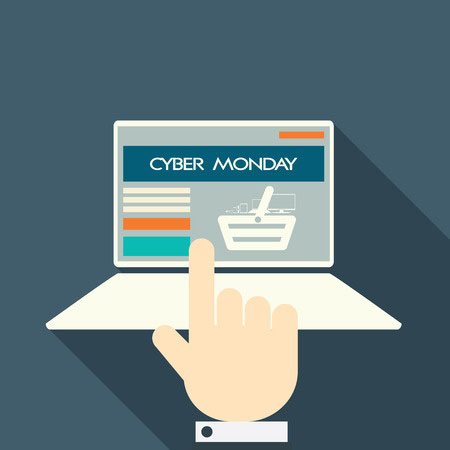
The holidays call for safe cyber shopping
By Cathy McVey, information technology services
 Have you ever wondered where the term Black Friday originated? Although there are a number of myths, the most commonly accepted history is that the term originated in Philadelphia in the late 1950s.
Have you ever wondered where the term Black Friday originated? Although there are a number of myths, the most commonly accepted history is that the term originated in Philadelphia in the late 1950s.
In anticipation of the big Army–Navy football game, large crowds would descend on the City of Brotherly Love the day after Thanksgiving. To keep order, police officers were unable to take that Friday off, hence they christened the day Black Friday, according to History.com. It wasn’t until the 1980s that the term came to refer to the retail mania we see today.
Black Friday was joined by Cyber Monday in 2005. This marketing term sought to build on the retail success of Black Friday and the surge of online shopping. That year, 77 percent of retailers reported an increase in online sales compared to the previous year, according to SmallBusiness.com.
If you are a Cyber Monday person, be sure you shop safely online to avoid turning the day into Black Monday by having your personal information and/or accounts stolen. There are some basic rules you can follow to make your online shopping safer. Google “safe shopping online” and there are a host of sites with tips and tricks to keep you safe. The list below is borrowed from PC Magazine, with added content from the American Bar Association.
1. Use familiar websites
Start at a trusted site rather than shopping with a search engine. Search results can be rigged to lead you astray. Beware of misspellings or sites using a different top-level domain (.net instead of .com, for example) — those are the oldest tricks in the book.
2. Look for the lock
Never ever, ever use your credit card on a site that doesn't have SSL (secure sockets layer) encryption installed. Look for HTTPS:// (instead of just HTTP://) in the web address (URL) that appears in the address bar. In addition, you will see a locked padlock, typically in the status bar at the bottom of your web browser or right next to the URL in the address bar.
3. Don't tell all
No online shopping site needs your Social Security number or your birthday to do business. However, if crooks get them, combined with your credit card number for purchases, they can do a lot of damage. Always give the least amount of information required.
4. Check statements
Go online regularly during the holiday season and look at electronic statements for your credit card, debit card and checking accounts. If you see something wrong, address the matter quickly.
5. Inoculate your PC
Swindlers don't just sit around waiting for you to give them data. Protect against malware with regular updates to your anti-virus program.
6. Use strong passwords
Utilize passwords that can’t be cracked. It's never more important than when banking and shopping online. And do not use the same password for multiple sites.
7. Think mobile
Your smartphone or tablet is safe for shopping, but use apps provided directly by the retailers, like Amazon, Target, etc.
8. Avoid public computers
It's a bad idea to use a public computer to make purchases. Always log out every time you use a public computer, even if you were just checking email.
9. Privatize your Wi-Fi
If you decide to go out with the laptop to shop, you'll need a Wi-Fi connection. Only use the wireless if you access the web over a virtual private network (VPN) connection and stick to known Wi-Fi networks.
10. Count the cards
Gift cards are the most requested holiday gift every year. Stick to the source when you buy one; scammers like to auction off gift cards with little or no funds on them on sites like eBay.
11. Know what's too good to be true
Once again, McAfee has compiled a Twelve Scams of Christmas list. Some of their advice:
- Watch out for the "coupon scam."
- Be skeptical of holiday job offers.
- Confirm message from anyone claiming they need you to wire transfer money to them.
Adding to PC Magazine’s list of 11, the American Bar Association also offers useful tips for online safety.
Selecting a payment method
Using a third-party payment processor such as PayPal, Google Wallet, and Amazon Payments means you can avoid submitting payment information to the seller, which reduces the risk.
What forms of payment should you avoid?
Your liability for unauthorized use of your ATM or debit card can be much greater than that for a credit card, depending on how quickly you report the loss. The faster you report, the smaller your liability.
If you send money using some other method, such as by a wire transfer or check, there's usually no way you can get the money back if something goes wrong with the transaction.
How can I determine whether an online seller is trustworthy?
Check the Better Business Bureau website, www.bbbonline.org. If the business is local and has a website, you can look it up on Yelp, www.yelp.com. Be aware that nearly all businesses attract at least some complaints. Better yet, find a friend or acquaintance who has dealt with the company.
Be safe: at home, online, and at work
While all of this information is important as you participate in Black Friday and Cyber Monday, these tips are relevant all year-round. They also apply to any purchasing you do as part of your job at Miami. So, shop safely online 365 days a year.
